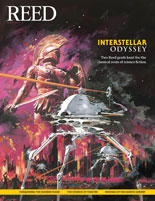
IRIS login | Reed College home Volume 94, No. 1: March 2015
Reediana
Thus Spoke Laozi:
Daodejing, A New Translation with Commentary
(Foreign Language Teaching and Research Press)
Prof. Emeritus Chalres Q. Wu

The Daodejing is one of the most stimulating texts that China has given to the world, and has probably been translated into English more often than any other piece of literature. Profound and abstruse, it defies easy comprehension, not to mention translation. Indeed, the long list of translations may be regarded as a record of continuous dissatisfaction.
Charles Wu adds more stimulation by offering a new translation, notable for its thoughtful reflections and lucid rendition. That should come as no surprise because it is hard to imagine anyone better trained than Prof. Wu in bridging English and Chinese literatures. He effortlessly offers, for instance, a Wordsworthian phrase of “wise passivity” as an explanation of wuwei, which he identifies as one of the “three key concepts in the Daodejing,” often translated as “nondoing” or “nonaction.”
This new book does not shy away from many thorny issues, some of which are almost as old as the text itself. A good example is his daring response to the question of why yet another translation is justified. Wu professes that he took up the task because he could “bring the readers another step closer to what Laozi actually says and how he says it.” This explains the phrase in the title, Thus Spoke Laozi.
A claim such as this, committed to finding the authorial intent, contradicts the “inevitable subjectivity of interpretation or translation” that he himself readily acknowledges. What I think is at work here is not his command of etymological and exegetical scholarship so much as the teacher in him. Charles Wu was a great teacher during his tenure at Reed, and he remains an excellent teacher in this new book. What he seeks is to help readers have “the aha! moment” in their reading of the Daodejing. Toward this goal, he combed through rich commentarial traditions and selected ideas that will stimulate readers. The kind teacher prepared the text bilingually, and in fact, the original Chinese text is included in both traditional and simplified scripts.
His discussion of the term Dao, and its literal rendition into “way” or “road,” which led to the adoption of the biblical “Way,” is a good example. Wu calls it the “first success” by sinologists and translators. He stops short of embracing it, however, and settles with using the transliteration, dao. He argues that the biblical “Way” in John’s Gospel (4:16) remains fundamentally a means because “no one comes to the Father” without it. Dao in the Daodejing, on the other hand, is “the ultimate Almighty and the Mother of all things.” This stimulates an exciting comparison. Wu leaves out the possibility of finding the ultimate truth simply in being on the “Way.” It is again the teacher in him that leaves this bridge for readers to find. The Nietzschean allusion, “Thus Spoke Laozi,” graces the cover of the book, but I dare not celebrate the publication as an occasion of approaching a step closer to hearing what Laozi spoke. I celebrate it as a chance to acknowledge once again, “Thus Charles Stimulated Us.

LATEST COMMENTS
steve-jobs-1976 I knew Steve Jobs when he was on the second floor of Quincy. (Fall...
Utnapishtim - 2 weeks ago
Prof. Mason Drukman [political science 1964–70] This is gold, pure gold. God bless, Prof. Drukman.
puredog - 1 month ago
virginia-davis-1965 Such a good friend & compatriot in the day of Satyricon...
czarchasm - 4 months ago
John Peara Baba 1990 John died of a broken heart from losing his mom and then his...
kodachrome - 7 months ago
Carol Sawyer 1962 Who wrote this obit? I'm writing something about Carol Sawyer...
MsLaurie Pepper - 8 months ago
William W. Wissman MAT 1969 ...and THREE sisters. Sabra, the oldest, Mary, the middle, and...
riclf - 10 months ago